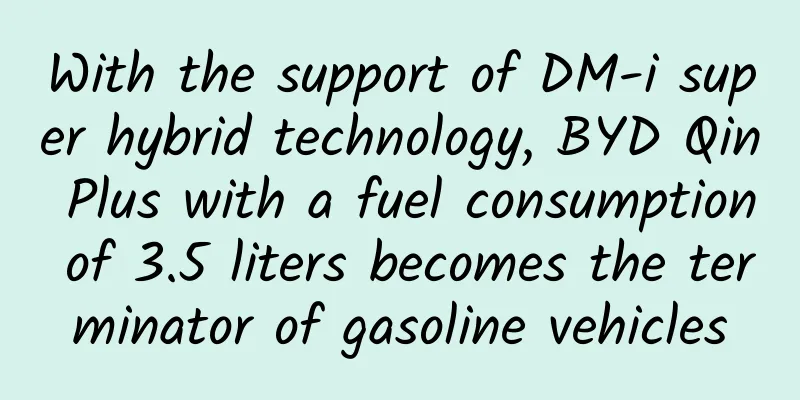With the support of DM-i super hybrid technology, BYD Qin Plus with a fuel consumption of 3.5 liters becomes the terminator of gasoline vehicles

|
On January 11, 2021, BYD released the "extremely fuel-efficient" DM-i super hybrid technology. The Qin Plus equipped with this technology has a nominal fuel consumption of 3.8 liters per 100 kilometers. How did the data of 3.8L/100km come from? Is it applicable to most driving scenarios? Is there any difference between the publicity data and actual driving? On January 16, 91che participated in the test drive event of Qin Plus with these questions. Now, let's talk about this technology and this car based on actual experience and data. The nominal fuel consumption is surprisingly restrained Unlike many manufacturers who only conduct constant speed tests at 60 km/h on closed roads for the sake of surface data, BYD arranged the fuel consumption test of Qin Plus in downtown Shenzhen. The entire test mileage is about 120 kilometers, which includes different road conditions such as urban roads, urban expressways, and highways. In addition, since there will be random road conditions such as traffic jams and traffic lights, this test is sufficient to reflect the actual driving conditions of most car owners. The vehicle tested by 91che this time is the Qin Plus DM-i pure electric range 55km version. In order to avoid the interference of battery energy on fuel consumption performance, our vehicle has consumed about 25% of its power before starting. This means that we are testing the fuel consumption performance of Qin Plus in the most extreme scenario. During the actual test, the traffic conditions in Shenzhen were quite complicated, and we often had to stop and slow down. We thought that the fuel consumption of Qin Plus would be higher than the official value. Unexpectedly, after the whole course, its fuel consumption per 100 kilometers was only 3.5L, which was about 0.3L lower than the official 3.8L. In comparison, the fuel consumption of a German car in the control group we drove reached 6.48L per 100 kilometers. In fact, the 3.5L of 91che is not the best result in this test - other media tested at the same time as us even ran an amazing 2.87L. In short, BYD, which dares to simulate actual driving scenarios, not only did not over-promote the data, but also appeared to be quite "modest and restrained". DM-i, China's own super hybrid technology After reading the above, many people will probably be amazed at the low fuel consumption of Qin Plus, and will also be curious about the principle of BYD's DM-i super hybrid technology. The automobile industry has undergone a century of evolution, and it is already extremely difficult to achieve a fuel consumption of "4 digits" per 100 kilometers. How did BYD make the leap to "3 digits"? First of all, this is of course due to BYD's complete set of DM-i super hybrid technology with core advantages. Taking the engine as an example, the Xiaoyun-plug-in hybrid 1.5L high-efficiency engine equipped in Qin Plus is specially developed for hybrid technology. On the basis of removing the front-end gear train of the traditional engine, it adopts the Atkinson cycle, with a thermal efficiency of 43%. In addition, BYD's dual-motor EHS super hybrid system brings a faster throttle response when accelerating. Here, we can mention the driving experience of Qin Plus. Although Qin Plus still has the "fuel legacy" in terms of energy supply, thanks to the large battery, the overall driving experience of Qin Plus is actually comparable to that of electric vehicles. To paraphrase BYD, Qin Plus is mainly powered by electricity, and has multiple advantages such as fast, economical, quiet, smooth and green. For example, most hybrid cars can be comparable to electric cars at the start, but once they reach high speeds, the internal combustion engine starts working and the hybrid car starts to become a "fuel car". However, Qin Plus does not have such a problem. According to BYD engineers, when driving at high speeds, the engine of Qin Plus will intervene in time. When we step on the accelerator hard, its internal motor will also provide energy in real time, which not only ensures the efficient use of energy, but also gives Qin Plus some "electric car" characteristics. Finally, and most importantly, BYD's algorithm advantage is the core point of making energy conversion and supply extremely efficient. In actual road conditions, the four energy supply modes of EV, series, parallel and direct drive will be cross-adjusted in real time, which not only brings fuel economy, but also redefines the word "super" in super hybrid - DM-i's algorithm is smarter. Since the end of the last century, Toyota has been the world leader in THS technology. However, the fixed design of the planetary gear set and motor also means that its engine cannot achieve more extreme energy conversion, and it is almost one level behind BYD's DM-i super hybrid technology in high-speed scenarios. Although Honda's i-MMD is similar in logic to BYD's DM-i super hybrid technology, Honda subconsciously still builds hybrid vehicle products based on the idea of gasoline vehicles. For example, the battery capacity of the Accord i-MMD system is only 1.3kWh, which restricts its short-distance energy utilization, while BYD's DM-i super hybrid technology has better fuel economy due to its large battery. The terminator of oil vehicles in the “transition period” At the time point of 2021, although the future trend of new energy vehicles is completely clear, the historical mission of fuel vehicles is about to be completed. But reality reminds us that although fuel and electricity are two energy sources in an iterative relationship, it does not mean that there is no transition space between the two. In fact, in the foreseeable 10 to 20 years, energy conversion will still be in a long-term transition process. The market has demand and the reality has space. BYD has launched the DM-i super hybrid technology and the Qin Plus car we experienced. From an industry perspective, the core advantage of BYD's DM-i super hybrid technology lies in its "algorithm" between fuel and electricity, which allows the battery technology it has developed over the years to reversely empower internal combustion engine technology. It not only achieves an excellent fuel consumption of 3.5L per 100 kilometers, but also solves the common range anxiety problem of new energy vehicle products from the root. Moreover, after creating such amazing technology, BYD did not focus on serving high-end users like the "two Toyotas". On the contrary, BYD is well aware that low-end users are more sensitive to fuel prices, so it set the starting price of Qin Plus at 107,800 yuan. In this sense, the emergence of BYD DM-i super hybrid technology in early 2021 not only launched a dimensionality reduction attack on fuel vehicle models on the market, becoming a veritable oil vehicle terminator, but also provided a simple and reliable implementation path for energy iteration in the entire automotive industry. As a winner of Toutiao's Qingyun Plan and Baijiahao's Bai+ Plan, the 2019 Baidu Digital Author of the Year, the Baijiahao's Most Popular Author in the Technology Field, the 2019 Sogou Technology and Culture Author, and the 2021 Baijiahao Quarterly Influential Creator, he has won many awards, including the 2013 Sohu Best Industry Media Person, the 2015 China New Media Entrepreneurship Competition Beijing Third Place, the 2015 Guangmang Experience Award, the 2015 China New Media Entrepreneurship Competition Finals Third Place, and the 2018 Baidu Dynamic Annual Powerful Celebrity. |
<<: Japanese manufacturing scandals continue: How can Chinese home appliance companies break out?
>>: Are electric cars afraid of cold? How Skywell developed its "self-heating" physique
Recommend
Besides being expensive, the most notable feature of the iPhone 8/X is that it is boring
The Magic is gone? The iPhone has become less and...
Damage to the liver, change genes? Do you still dare to "eat rainbow"?
Snacks are really a magical thing. From children ...
Stop hoarding food! Someone has already gotten into trouble!
This article was reviewed by Pa Li Ze, chief phys...
A small gadget that can relieve stress at a low cost. I really recommend you to try it!
Aromatherapy candles, a craft that combines light...
You have watched a lot of doomsday science fiction movies, but have you ever thought about where is the best place to take refuge?
Written by: Qi Dazai Layout: Li Xuewei If global ...
Taoist "Yin Pan Qi Men Dun Jia" training course video lecture
Qi Men Dun Jia course, this course is 1.96 GB in ...
OPPO, vivo, Xiaomi, Huawei: Among the four domestic companies, who is the marketing veteran?
OPPO and vivo , which were ridiculed as factory g...
Shenzhen’s expected full lifting of lockdown in 2022: When will the lockdown be lifted and normalcy restored? Attached is the latest unblocking notice
On March 13, Shenzhen issued the latest epidemic p...
Measuring the height of Mount Tai, counting the wine jars in the wine pile... How did the ancients solve "tricky" problems?
Measuring the height of Mount Tai, calculating th...
These days, the whole world is paying attention to this monkey! How does the graphics card light up every frame of fantasy on the journey to the West?
At 10:00 am on August 20, the domestic game "...
There are many pitfalls on the road to treating hair loss. Why is it so difficult to grow hair?
Author: Zhang Jianzhong, Chief Physician, Peking ...
The largest cable TV operator in the U.S. is launching Internet TV for $15 a month
In the era of mobile Internet, the TV market has ...
18 most classic user growth operation cases on the Internet
Part 1: Growth Hacking and Related Concepts 1. Gr...
Comic strip | Why does your brain delete your memories before the age of two?
Source: Higher-end humans...
I was diagnosed with cancer at the age of 25, but I didn't take it seriously because I had symptoms two years ago! These "words" in the medical examination report are dangerous!
Many people schedule a physical examination for t...









